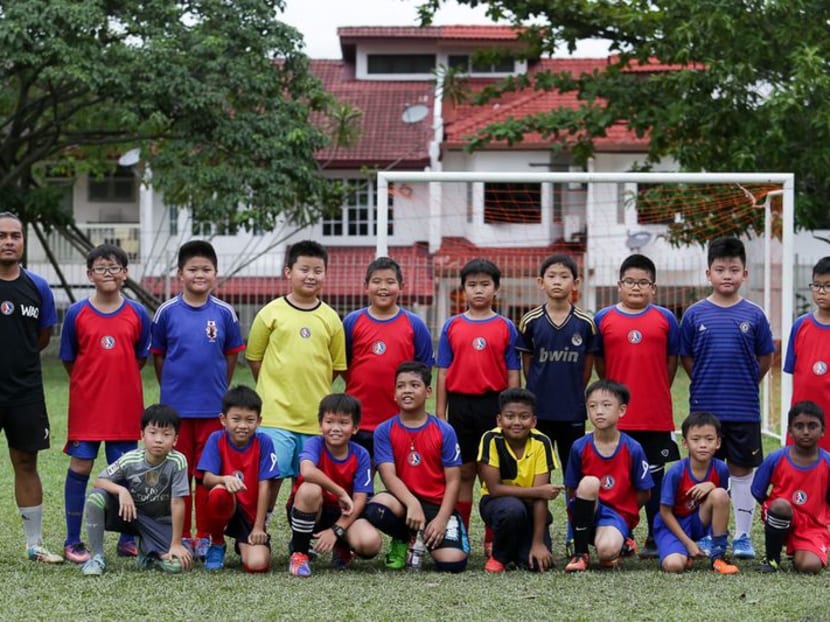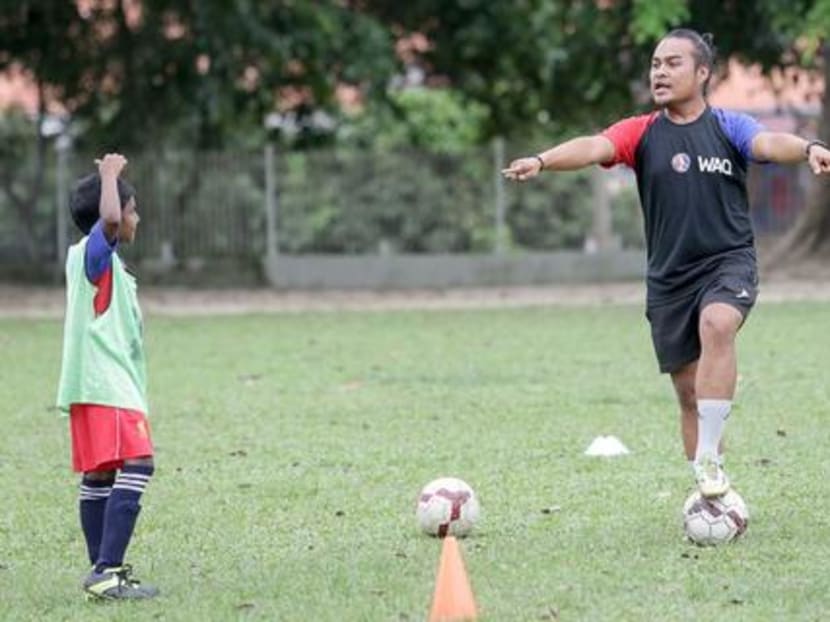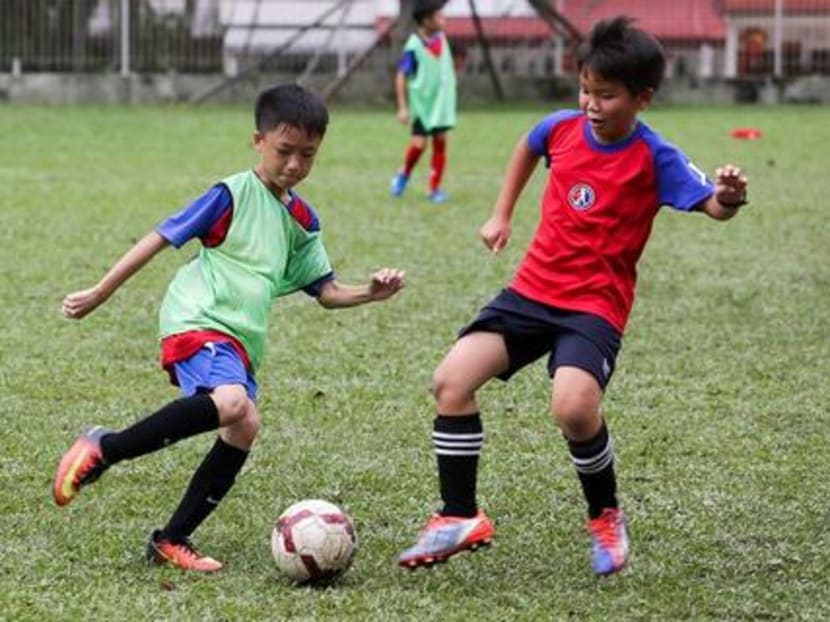A Malay coach, a Chinese school and a dream of becoming football champions
KUALA LUMPUR - In the middle of a damp pitch, 11 kids from the Yoke Nam Chinese primary school were positioned awkwardly in an attacking formation. Just in front of the centre-forward, their coach, Azmeel Firdaus, stood ready with his whistle in his hand.

Inspired by the movie ‘Ola Bola’, Yoke Nam Chinese Primary School assembled its first ever football team ALL PHOTOS: MALAY MAIL ONLINE
KUALA LUMPUR - In the middle of a damp pitch, 11 kids from the Yoke Nam Chinese primary school were positioned awkwardly in an attacking formation. Just in front of the centre-forward, their coach, Azmeel Firdaus, stood ready with his whistle in his hand.
“When I blow the whistle once, you run forward,” Azmeel shouted while waving his hand to indicate in which positions each of the players should be while attacking in a game.
But as Azmeel blew the whistle, the most important player — the centre-forward, the one whom the team counts on to score a goal — ran backwards towards the middle of the field. He thought the instruction was to defend.
This communication blunder has come to characterise the preparations of Yoke Nam’s primary school football team which will make its debut in the under-12 Federal Territory Kuala Lumpur Primary School Football (MSSWPKL) tournament in two weeks’ time.
Azmeel knew he had an uphill task. Yoke Nam has never had a football team before, which means he will be leading a team with zero experience to compete against powerhouses like the Bukit Jalil National School and 13 other schools for the Bangsar Zone championship, some of which are known to have produced national talents in the past.
“Most of them only started playing football a year ago so it’s a big challenge for me to get them to play good football or even master the basic stuff like tactics and formation,” he told Malay Mail Online at the sideline.
“I’m not focusing on what their chances are playing against national schools. As you know, this is the first time Yoke Nam is going for the MSSWPKL. My first target is… I just want to let them have fun. Let them feel what it’s like to play in a tournament,” Azmeel added.
Since the tournament is virtually dominated by Malay national schools, Yoke Nam’s decision to participate in this year’s game surprised many, particularly those who sit on the all-Malay organising committee.
Recalling the comical event that took place during a meeting with the committee members, the teacher in charge of managing the team — who prefers to just be known as Ms Lim — said the panel initially thought Yoke Nam wasn’t serious and many did not even believe the school had a football team.
“They asked me: “Yoke Nam actually have a football team?” Ms Lim said as she recounted her meeting with the committee last month.
“Then I said yes we do and we want to participate. Even after I said yes they kept asking “you sure you want participate?” she said with a smile.
Racial stereotypes
The committee’s reaction is hardly surprising. There is a quiet understanding that football is traditionally a sport of the Malays. While the fanbase may be multiracial, the country’s ethnic majority controls every other aspect of the game.
Which is perhaps why other races tend to stay away from football. The identification of sports according to race push the minorities to adopt other games, something they can call their own.
Based on this thinking, Malaysians have generally come to associate Chinese schools with basketball and badminton, and Indian and Sikh youths with the sport of hockey.

Azmeel (above) admitted that he had such a stereotype in mind, and it initially made him sceptical about taking up the coaching job at Yoke Nam.
Next to assuming that the children will likely have little skills, the language barrier would also be a major obstacle.
“Actually in the beginning I thought it was going to be a bit hard because it would be my first time coaching a Chinese school. Before this I’ve only coached international and national schools and most of the players were Malays.
“And I really thought that since I’m going to coach Chinese kids, the language barrier may be a problem. And it was (in the beginning),” he said.
Indeed communicating with the children became one of Azmeel’s biggest problems. Most of his players couldn’t speak Bahasa Malaysia well. Their first language is Mandarin.
To coach a team sport as technical as football without fluid communication, especially to children with almost zero experience in playing the game, is like expecting a literature graduate to design a bridge.
Fortunately, almost all the children in the team speak fluent English. But that doesn’t mean it was all easy. Azmeel admitted he struggled at first to make his players understand his instructions because his own command of the language was not that good.
Despite the predicament, Azmeel was adamant that he would make it work — he doubled his efforts to improve his English, which he eventually did. But what drove him to work harder was not so much the responsibility he carried as a paid coach entrusted to train the kids, but the fact that his players showed tremendous “heart” in wanting to prove wrong the stereotype that Chinese boys can’t play football.
“What made me stay was even though they only started playing football late, they still showed heart. They showed effort and hard work most of the time.
“That touched me,” he said.
Ola Bola
To the Yoke Nam players, they know well that they will go into the tournament handicapped, facing much tougher opponents from national schools with many years of football development experience and strong state support.
But the children are in good spirits and are not in any way intimidated. Some are confident they can stage a surprise, while some believe they can even be champions.
“I don’t care if people think it’s a Malay sport. I think everyone can play and I’m not afraid,” 12-year-old team captain and midfielder Victor Tan Jun Lim told Malay Mail Online.
“We want to win the cup,” he said

Victor, despite being slightly chubby and bespectacled, displayed enormous confidence in himself and his team-mates. He said he drew inspiration from Ola Bola, the award-winning fictional movie based on the story of the only Malaysian national football team that qualified for the Moscow Olympics in 1980.
But children being children, Victor said the choreographed skills acted in the movie was what inspired him and many of his friends to want to play competitive football, not so much the message of racial unity director Chiu Keng Guan had intended to deliver.
Yet unwittingly, the 12-year-old captain admitted that it made him and others just like him believe that even Chinese boys can play football if they really put their minds to it.
When asked who his footballing inspiration was, Victor replied “Messi”, referring to Argentinian and Barcelona megastar Lionel Messi.
But when queried again if Messi was the player that made him to want to play the game, he replied: “No. Ola Bola.”
In fact the movie about Malaysia’s multiracial football team helped lay the foundation for Yoke Nam’s football team: It inspired the school’s parent-teacher association head, Casey Tan, to suggest that the school step out of its comfort zone, and try to accommodate the growing interest in football among its students.
“I think after it was after Ola Bola. They really got into football after the movie… so we thought since we already have a pitch and the boys are really into it, why not we set up a team,” he said.
“Other parents were very supportive of the idea. Everyone started to chip in and wanted to contribute,” he added.
Inspiration
Yoke Nam’s bold decision to break the sports-race stereotype by participating in a sport dominated by Malays has inspired other nearby Chinese schools to set up their own football teams, something that was almost unheard of in the past, Tan said.
“You know Chinese schools. If it’s not basketball, it’s badminton. But we inspired other schools to have their own football team… it’s something positive.”
For Azmeel, he could not have been prouder. But most importantly he felt Yoke Nam’s participation in the MSSWPKL tournament could be the first step towards breaking a barrier that has prevented the world’s most loved sport from unifying Malaysians.
“I feel proud to lead the first Chinese team into the tournament where Malay or national schools dominate. I also feel this is the first step towards breaking that barrier, to show that Chinese boys can also play football.
“This would be opening up a lot of eyes for other Chinese or Indian schools. It could also help open the idea of national schools selecting more Chinese players,” he said. THE MALAY MAIL ONLINE





